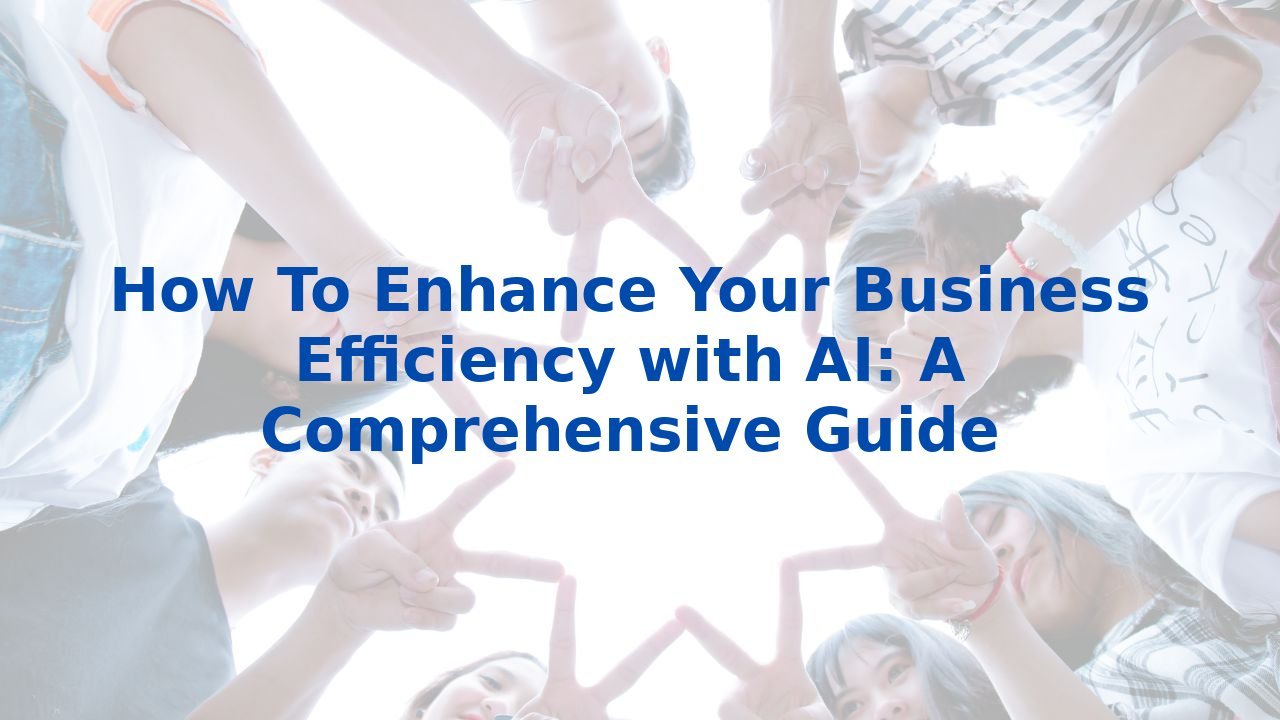How To Enhance Your Business Efficiency with AI: A Comprehensive Guide
How To Enhance Your Business Efficiency with AI: A Comprehensive Guide
In a world where speed and efficiency dictate the trajectory of success, organizations are in need to explore every avenue to get ahead. One of the most groundbreaking tools at our disposal is Artificial Intelligence (AI). This isn't just about tech-savvy upgrades; it's about revolutionizing how we approach everything—from routine tasks to intricate decision-making. Let’s break down how AI can enhance business processes, and in turn, elevate efficiency to unprecedented levels.
1. Automation of Routine Tasks
One of AI's most impactful advantages is its ability to automate mundane, repetitive tasks. This capability doesn't merely save time; it invigorates the workforce. Picture this: while AI handles data entry, invoice processing, and meeting scheduling, your team gets to channel their energy into strategic and creative undertakings that drive innovation. With AI-powered bots taking over the drudgery, organizations can enhance not only productivity but also employee satisfaction as they engage in more meaningful work.
2. Process Optimization
AI shines brightest in optimizing business processes. By sifting through data, AI identifies bottlenecks and redundancies that plague workflows. This analytical prowess allows organizations to streamline operations, restructure procedures, and reallocate resources where they are needed most. The result? Accelerated task completion and a lean operation that sings with productivity. AI empowers businesses to not just move fast, but to move smart.
3. Improved Decision-Making
Imagine leaning on AI to make decisions grounded in data rather than gut feelings. AI extracts insights from vast amounts of information, helping leaders make informed, unbiased choices. With tools that analyze trends and sentiments from employee feedback, management can gain a clearer picture of their workforce’s desires, leading to more strategic organizational changes. The days of decision-making based solely on intuition are fading away; welcome to the era of data-driven clarity.
4. Enhanced Productivity
Generative AI tools are not just a hype; they've been empirically shown to ramp up productivity levels significantly. Statistics suggest that such tools can enhance output by as much as 66%. Whether it’s a customer support agent fielding more inquiries or a business professional drafting reports, AI tools allow for more efficient project completion. They don’t just support productivity; they accelerate it to new peaks.
5. Better Quality and Reduced Human Error
With the integration of AI and robotic process automation (RPA), organizations witness a dual benefit: speed coupled with accuracy. AI doesn’t get tired or distracted; it consistently performs tasks with a level of precision that human employees might struggle to maintain. In areas like financial reconciliation, AI can provide near error-free outputs, a level of performance that bolsters an organization’s value proposition in competitive markets.
6. Faster Learning and Improved Employee Training
AI streamlines the learning process by offering real-time assistance tailored to individuals’ needs. This personalization not only enhances engagement but also accelerates knowledge retention. As companies integrate AI-driven training modules, they enable their workforce to grasp complex concepts swiftly—maximizing the effectiveness of training and onboarding programs. A well-trained workforce isn’t just a luxury; it’s a necessity for thriving in an AI-empowered world.
7. Enhanced Communication and Collaboration
AI-powered tools are transforming team dynamics. By managing routine communications and organizing information flow, AI optimizes collaboration across departments. Intelligent scheduling tools analyze calendars for the best meeting times, ensuring meaningful discussions happen without unnecessary delays. When communication flows effortlessly, teams are more aligned, more impactful, and ultimately, more successful.
8. Risk Management and Supply Chain Optimization
AI’s analytical capabilities extend into risk management and supply chain logistics, giving businesses a complete view of potential threats and opportunities. By analyzing data trends, AI predicts demand changes, optimizes inventory, and proposes the most efficient shipping routes. This strategic foresight minimizes risks and reduces costs, resulting in a responsive and agile supply chain—a crucial factor for maintaining competitive advantage.
The Benefits of Training Your Employees for AI
While integrating AI is vital, employee readiness is equally important. Training programs that focus on understanding AI capabilities enable employees to collaborate effectively with these systems. It's not simply about using tools but realizing how they can augment human strengths rather than replace them. Organizations should invest in comprehensive training programs tailored to their teams, fostering adaptability and fluency in new AI-driven workflows.
By developing a workforce skilled in AI technologies, businesses are not just preparing for the present; they’re investing in a brighter, more efficient future.
Conclusion
AI is more than just a buzzword; it’s a powerful enabler of business efficiency. By automating tasks, optimizing processes, and enhancing decision-making, organizations can unlock unprecedented levels of productivity and innovation. To harness the full potential of AI, companies must embrace these technologies and prioritize employee training. As we stride into this new era, the organizations that adapt, learn, and evolve will emerge not just as survivors but as leaders reshaping the landscape of business operations.



